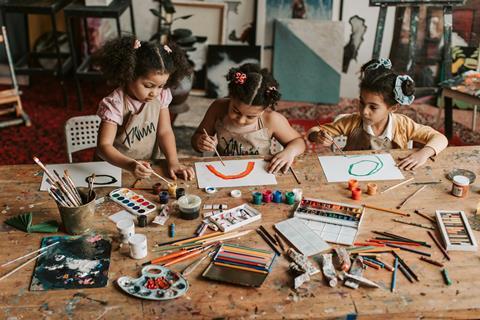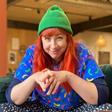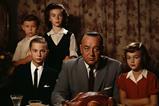As we enter Children’s Art Week Sophie Killingley explains why it’s so important to not discourage art in our kids

Picasso said: “Every child is an artist. The problem is how to remain an artist once we grow up”
This week is Children’s Art week! As a freelance artist and writer, and mum of two extremely creative neurodivergent teenagers, I spend an inordinate amount of time thinking about art, creativity, and what it means to cultivate that in both ourselves and our children.
The Picasso quote tells us something important. Something happens during childhood which crushes the artist within. The question isn’t about how as a parent you can ‘encourage’ your child in art, but rather, how do you stop inadvertently discouraging them! We do it without even consciously realising it, and our hidden Christian assumptions may be playing their part as well.
The genesis of some of our hang-ups about art
Do you remember the joy of making a mess and painting with an apron on in primary school? I do! The scratchy brushes, the bright poster paint, the way I would start with a lopsided tree, continue to add colour after colour after colour until it all turned a murky brown. And then I would triumphantly place it on the drying rack, feeling satisfied with my masterpiece. Excitedly presenting it to my Mum at the school gate later. Unbridled confidence and total delight.
A young child will rarely, if ever, present you with their Sunday school craft, or school picture and say: “I just don’t think I really captured the essence of this, and the colour value and light and shade is all wrong.” No! They will be delighted that they MADE something!
Can you pinpoint the moment it happened for you? Can you remember the teacher who said “Art, pfft, not for you”
We lose that along the way. Some of it is the gradual realisation of skill level, as we compare with others. But so often, it will be inadvertent words and repeat attitudes from a parent or teacher that crush that small inner artist that was just happy to have created. The joy is replaced with a sense of shame and inadequacy, which then gets covered in humour as a defensive mechanism. Or perhaps an internal resistance to art, as it’s ‘just stupid’ anyway.
If I asked you to draw something now, would you be able to hand it to me without an awkward smile and the words I hear from nearly every adult, “I don’t have an artistic bone in my body”, or “I’m good at stickmen but that’s about it”.
Whether its defensive humour or that surprisingly angry reaction to modern art, “My 5-year-old could do that”, if you uncover the emotion in the driving seat, often you will find a sense of inadequacy or shame.
Can you pinpoint the moment it happened for you? Can you remember the teacher who said “Art, pfft, not for you” or the parent who scoffed “Well that doesn’t look like a horse, does it? More like a deranged dog!”
Or the well-meaning comment during a chat about the future when you were told “Don’t do an arts subject, there’s no money in that,” or “Why don’t you do something useful?”
Those are all comments I heard, which made me feel guilty about the creative drive within me and led to me a ‘useful’ law degree that I never ended up using!
The fear behind the hang-ups
What drives these comments? Often, it’s fear. Perhaps financial fear: we don’t want our children to struggle. With no real experience of creative industries, we wrongly assume that the pathway is either lucrative genius or abject poverty. The truth is, there are a huge variety of different jobs out there. Things have changed so much even in the past 25 years, and the threat of AI isn’t going to reverse that.
There’s also spiritual fear, the worry about our children’s spiritual lives. Aren’t arty folk, well, kind of odd? They always seem to be on the edges of “decent” society, they hang out with equally strange folk. And worst of all, they ask uncomfortable questions.
Creative minds often have a holy dissatisfaction with shallow, glib spirituality
Yes! They do! Artists are what Japanese artist Makoto Fujimura (a Christian) terms “border-stalkers”. People who inhabit the edges of life, pushing boundaries, asking the hard questions. Not entirely unlike Jesus.
These qualities are not at odds with being a Christian but a gift to both society and the church. Creative minds often have a holy dissatisfaction with shallow, glib spirituality. They search for truth above comfortable ‘pat answers’, and they have an ability to communicate that in new ways.
But as parents we can fear for our children. Perhaps there’s much about the creative mind you don’t get or just want to protect your child from. But in truth, we can’t protect them from everything, and (inadvertently) causing shame about a creative mind will not serve them in the long term.
The tyranny of the ’useful’
As evangelical Christians we can also be awfully pragmatic with how we view our faith. ‘Useful’ jobs like doctor, nurse, teacher, pastor, etc are viewed to be of more “gospel value”. Certain jobs have more practical, definable outcomes, and are therefore seen as more helpful to society in a qualitative way.
But there is so much wonky thinking held within those types of evaluations. Art is such a gift, even if you can’t perhaps immediately understand its ‘use’.
Remain curious and open your imagination, allowing your child to do the same
It is God given (did you know the Spirit of the Lord is first noted as being given to an artist? Check out Exodus 31 and Bezalel). One of the first scriptural revelations we receive about God is that he is a creator. Whether we pursue a job in the creative sector or not, drawing, painting, writing stories, poetry, animating, designing are all wonderful gifts from God. But so often these pragmatic, financial and spiritual concerns cause us as parents to unconsciously discourage or block the pathway in our creative children.
Read more:
Jung is quoted as saying “the biggest burden that a child must bear is the unlived life of the parent”
Our own mental blocks, un-attempted ambitions and old hurts impact our children far more than we realise. Fear crystalises and becomes a heavy burden we pass onto them, all the while thinking we are being pragmatic, faithful Christians. Take these old hurts to the Lord. Ask him to remove long-held views that no longer serve. Let the joy of the Lord be your strength and confidently encourage your child in their creative endeavours. Remain curious and open your imagination, allowing your child to do the same. As Francis Schaeffer writes: “Christians…ought not to be threatened by fantasy and imagination. The Christian is the one whose imagination should fly beyond the stars.”
Further resources
Some resources which I would recommend on furthering your thinking on the beauty and goodness of art, and having artists in the church include:
- Why Art Matters by Ally Gordon
- Art + Faith by Makoto Fujimura
- Imagination Manifesto by Ted Turnau and Ruth Naomi Floyd.
- The Artists Way by Julia Cameron

































